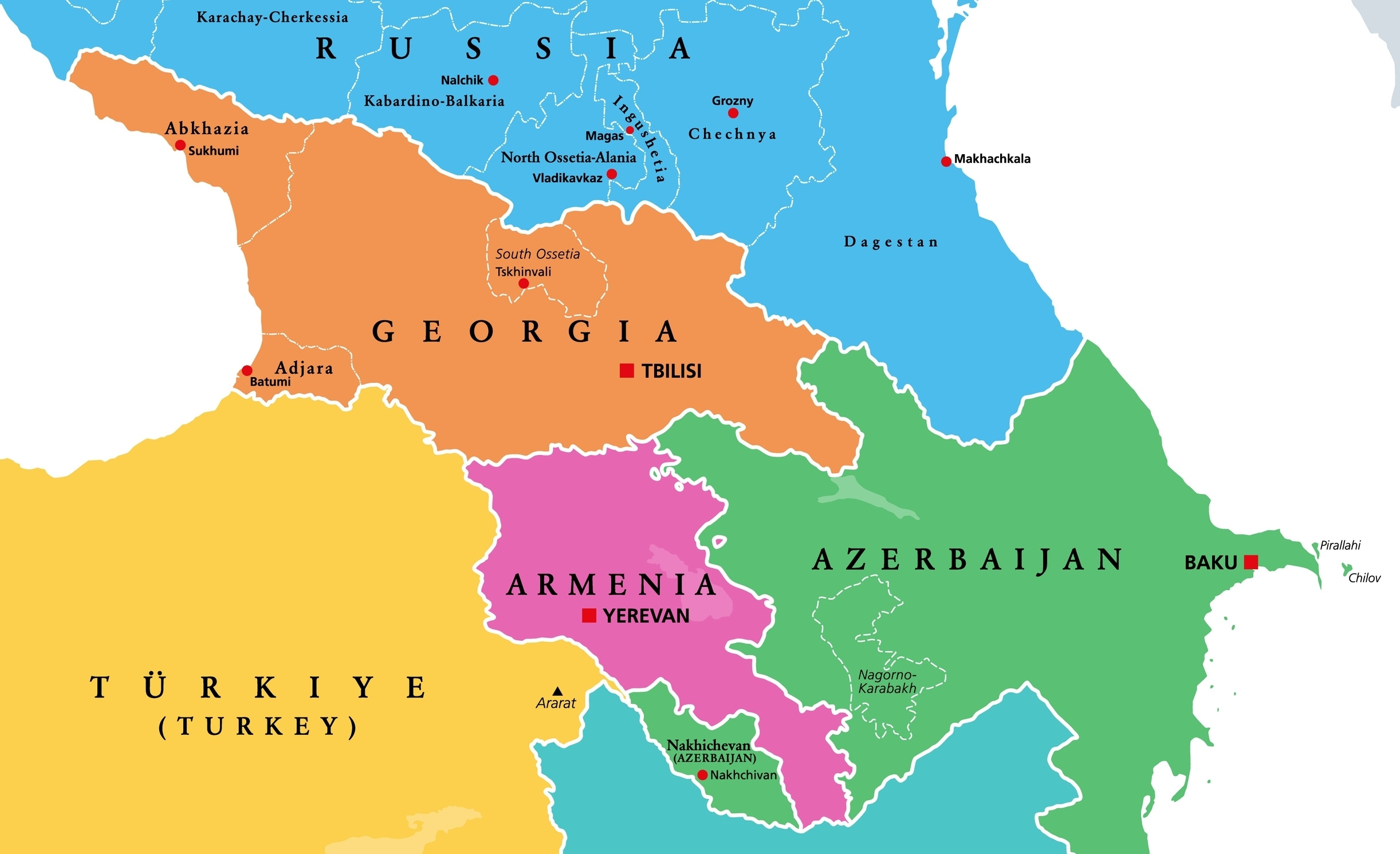Any doubts about Turkey’s importance on the global stage were well and truly settled at the inauguration of the country’s newly re-elected President, Recep Tayyip Erdoğan, just under four weeks ago. [1]
Indeed, world leaders and dignitaries flocked to the Turkish capital, Ankara, from around 78 countries — including 21 heads of state, 13 prime ministers, as well as representatives of several important international organisations. [1]
Capacious global influence
The abovementioned VIPs showcased just how extensive Turkey’s relations with the wider world really are.
In attendance were, among others:
| Name | Office |
|---|---|
| Shavkat Mirziyoyev | President of Uzbekistan |
| Kassym-Jomart Tokayev | President of Kazakhstan |
| Hassan Sheikh Mohamud | President of Somalia |
| Ali Bongo Ondimba | President of Gabon |
| Nicolás Maduro | President of Venezuela |
| Ersin Tatar | President of the Turkish Republic of Northern Cyprus (TRNC) |
| Vjosa Osmani-Sadriu | President of Kosovo |
| Rumen Georgiev Radev | President of Bulgaria |
| Shehbaz Sharif | Prime Minister of Pakistan |
| Jens Stoltenberg | Secretary General of the North Atlantic Treaty Organization (NATO) |
| Hissein Brahim Taha | Secretary General of the Organisation of Islamic Cooperation (OIC) |
Two intriguing attendees
However, the presence of two guests in particular requires special attention.
During the event, President Erdoğan greeted the leaders of two warring nations, President Ilham Aliyev of Azerbaijan and Prime Minister Nikol Pashinyan of Armenia. The two states, along with Georgia, make up the three countries of the South Caucasus region nestled between Russia, Turkey, and Iran.
And though culturally rich and diverse, the area has been wracked by the ongoing conflict between Azerbaijan and Armenia over the Nagorno-Karabakh region since the fall of the Soviet Union.
Both countries stand to gain from their ties with Turkey, and these relations could also make a lasting peace settlement more likely, inshāAllah.
Azerbaijan, Armenia, & Nagorno-Karabakh conflict
Before evaluating Turkey’s role in this conflict—and hopefully its resolution — some background is necessary.
The conflict began in the waning years of the Soviet Union, with the outbreak of fighting between Azerbaijani forces and Armenian separatist fighters seeking Nagorno-Karabakh — an autonomous enclave with a majority Armenian population within the Azerbaijan Soviet Socialist Republic — to unite with Armenia.
With independence from Moscow in the early 1990s, the region — also home to Shusha, a city seen by Azerbaijanis as their country’s cultural capital — became the object of a full-scale war between Armenia and Azerbaijan.
1994 Ceasefire and internally displaced people
A 1994 ceasefire later left the whole region and the seven neighbouring Azerbaijani-majority areas either totally or partially under Armenian control, administered by a self-proclaimed state known as the Republic of Artsakh.
Neither Armenia, nor any other countries recognise the breakaway republic, but it is backed unofficially by Yerevan. The UN and wider international community, meanwhile, recognises Nagorno-Karabakh and the other seven regions as part of Azerbaijan.
Both countries have seen thousands of casualties, and many people including Armenians living in Azerbaijan, as well as Azerbaijanis living within Armenia, have become refugees after fleeing their homes.
Hundreds of thousands of Azerbaijanis also fled the occupied territories during the conflict, becoming internally displaced persons (IDPs). At the time of the ceasefire, the International Crisis Group put the number of IDPs at around 600,000. [2]
2020 Escalation, ceasefire, and fresh hopes for peace
Intermittent outbreaks of fighting continued, but the tide of the conflict really turned in late 2020, when a 44-day war saw Azerbaijan regain parts of Nagorno-Karabakh including Shusha, and all of the seven surrounding regions, either through military means, or as part of a diplomatic ceasefire settlement brokered by Russia, the hegemonic power in the South Caucasus.
Occasional border skirmishes have still taken place between the two nations since then, but the picture is drastically different than three years ago.
Injections into freed territories
The Azerbaijani government has led an ambitious redevelopment campaign in the now de-occupied territories with the opening of two new airports, and the resettlement of some IDP families in recently built smart villages. [3] [4]
There has also been renovation of heritage desecrated during the occupation. Such buildings include the Juma Mosque in Aghdam, the only building that still stands in the city that was largely levelled.
Thawing diplomatic relations
In addition to the developments noted above, the two countries’ leaders, Mr. Aliyev and Mr. Pashinyan, have held multiple meetings since the 2020 ceasefire.
Relations between the neighbours are, of course, by no means warm, but this year has seen fresh hopes for peace, normalisation of relations, and respect for territorial integrity emerge.
To this end, late last month Azerbaijan’s President Aliyev expressed his belief that a peace treaty was possible. And earlier in June, the Secretary of the Security Council of Armenia, Armen Grigoryan, shared his view that a deal could be inked before the end of the year. [5] [6]
So what is Turkey’s role?
At first glance, it may not be immediately clear where Turkey fits into this evolving situation, and why it is so important.
However, it has borders with all three component countries of the South Caucasus, is a staunch ally of Azerbaijan, and also has warm ties with Georgia.
Though not as influential as Russia — the region’s traditional power broker — Ankara has demonstrated its significance to the area’s dynamics in recent years.
Turkey-Azerbaijan: “one nation, two states”
Turkey’s support for Azerbaijan stems in part from their shared heritage. The countries sometimes call themselves “one nation, two states”. [7]
After all, they both have Muslim majorities, share common history and Turkic culture, and their languages are fairly similar, too. Fuel-rich Azerbaijan is also a crucial supplier of oil and gas to Turkey.
Turkey’s support for Azerbaijan was also decisive during the 2020 war. Baku’s purchase of Turkish-made Bayraktar TB2 drones helped give the Azerbaijani military the edge when the hostilities resumed. The drones played a key role in the victory by destroying their opponent’s key strategic infrastructure, armour, and ordnance in the conflict area.
In this sense, the Turkish drones helped Azerbaijan to regain most of its territory, and drastically alter the regional status quo in its favour, for the first time in decades. With Azerbaijan’s territorial grievances largely — though not entirely — settled, the country has expressed a willingness to create a lasting peace with Armenia, subject to its meeting of key conditions.
Turkey-Armenia: frosty but hopeful?
Since it was Baku’s use of Turkish military technology that helped bring about Azerbaijan’s victory, and consequently Armenia’s capitulation of most of the territory it once occupied, one could very reasonably question what Armenia could possibly hope to gain from a closer relationship with Ankara.
The situation may seem even more unthinkable, considering Ankara and Yerevan have not had formal relations since 1993, when Turkey unilaterally cut ties and closed its border with Armenia, in solidarity with Azerbaijan during the first Nagorno-Karabakh war.
However, despite losing the 2020 war, Armenia has a chance to win the peace alongside Turkey and Azerbaijan. Armenia could make respectable economic gains in the post-war regional setup. The opening of its border with Turkey could give Armenia easier access to both Turkish markets and Black Sea ports while stimulating trade. It could also see the country included in new cross-regional infrastructure projects, as both Georgia and Azerbaijan have in the past. This could, in turn, create jobs and bring much needed investment into the country.
These opportunities appear to be more within Armenia’s grasp than ever before. After all, Turkey has made peace with Azerbaijan a key condition for full normalisation, and Baku and Yerevan have made positive steps in that direction. Last month, both Azerbaijan and Armenia crossed a key milestone in the process by recognising each other’s territorial integrity; crucially for Baku, Yerevan acknowledged Azerbaijan’s sovereignty over the entirety of Nagorno-Karabakh and the other seven fully de-occupied regions. [8]
Optimism for prosperity in the South Caucasus
With all of the above in mind, Prime Minister Pashinyan’s presence in Ankara during the presidential inauguration should be seen within the wider framework.
Pashinyan briefly met with his Azerbaijani counterpart, Aliyev, after the inauguration event. They reportedly discussed the normalisation process, and this came after the Armenian leader had previously made overtures to Turkish President Erdoğan about doing the same with Turkey. [9]
Congratulations to President @RTErdogan on his re-election. Looking forward to continuing working together towards full normalisation of relations between our countries.
— Nikol Pashinyan (@NikolPashinyan) May 28, 2023
Turkey and Armenia on the mend
Both countries have already made small gestures towards this goal.
Direct passenger flights have been restored between Istanbul and Yerevan. [10] Earlier this year, the two countries also announced plans to repair a historic bridge on the Turkish-Armenian border that was once used by trade caravans centuries ago. While this move is largely symbolic in nature, it clearly highlights the ambition for trade and joint infrastructural projects to play a key role in sustaining peace and prosperity in the South Caucasus.
What also remains clear is that Turkey has played and continues to play an important part in regional developments, being a firm friend to Azerbaijan, but also offering Armenia warmth and valuable economic incentives.
I ask Allah to grant the South Caucasus a peaceful settlement that benefits all the people of the region with prosperity, plenty, and success.
As He (subḥānahu wa ta’āla) states in the Qur’ān,
“Perhaps Allah will make friendship between you and those whom you hold as enemies. And Allah has power over all things, and Allah is Oft-Forgiving, Most Merciful.” [11]
Also read
- Forgotten Hero of Islam: Alp Arslan
- The Lion of Dagestan | Imam Shamil
- Shaykh Haitham reflects on Erdogan’s victory
Source: Islam21c
Notes
[2] https://www.crisisgroup.org/europe-central-asia/caucasus/azerbaijan/azerbaijan-s-idp-burden
[3] https://eurasianet.org/azerbaijan-opens-its-second-international-airport-in-karabakh
[4] https://caspianpost.com/en/post/lachin-return-starts
[5] https://www.dailysabah.com/politics/diplomacy/azerbaijan-armenia-seek-peace-deal-in-talks-in-russia
[7] https://president.az/en/articles/view/736/print
[9] https://hetq.am/en/article/156763
[10] https://www.aljazeera.com/news/2022/2/1/with-flights-set-to-resume-what-next-turkish-armenian-ties
[11] al-Qur’ān, 60:7









